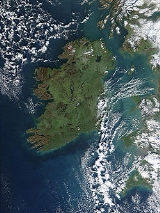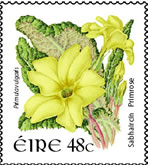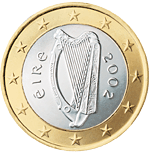
Éire
Encyclopedia

Irish language
Irish , also known as Irish Gaelic, is a Goidelic language of the Indo-European language family, originating in Ireland and historically spoken by the Irish people. Irish is now spoken as a first language by a minority of Irish people, as well as being a second language of a larger proportion of...
name for the island of Ireland
Ireland
Ireland is an island to the northwest of continental Europe. It is the third-largest island in Europe and the twentieth-largest island on Earth...
and the sovereign state of the same name
Republic of Ireland
Ireland , described as the Republic of Ireland , is a sovereign state in Europe occupying approximately five-sixths of the island of the same name. Its capital is Dublin. Ireland, which had a population of 4.58 million in 2011, is a constitutional republic governed as a parliamentary democracy,...
.
Etymology
The modern Irish Éire evolved from the Old Irish word ÉriuÉriu
In Irish mythology, Ériu , daughter of Ernmas of the Tuatha Dé Danann, was the eponymous matron goddess of Ireland. Her husband was Mac Gréine ....
, which was the name of a Gaelic
Gaels
The Gaels or Goidels are speakers of one of the Goidelic Celtic languages: Irish, Scottish Gaelic, and Manx. Goidelic speech originated in Ireland and subsequently spread to western and northern Scotland and the Isle of Man....
goddess. Ériu is generally believed to have been the matron goddess of Ireland, a goddess of sovereignty, or simply a goddess of the land. The origin of Ériu has been traced to the Proto-Celtic reconstruction *Φīwerjon (nominative singular Φīwerjō). This suggests a descent from the Proto-Indo-European
Proto-Indo-European language
The Proto-Indo-European language is the reconstructed common ancestor of the Indo-European languages, spoken by the Proto-Indo-Europeans...
reconstruction *piHwerjon, likely related to the adjectival stem *piHwer- (cf. Sanskrit
Sanskrit
Sanskrit , is a historical Indo-Aryan language and the primary liturgical language of Hinduism, Jainism and Buddhism.Buddhism: besides Pali, see Buddhist Hybrid Sanskrit Today, it is listed as one of the 22 scheduled languages of India and is an official language of the state of Uttarakhand...
pīvan, pīvarī and pīvara meaning "fat, full, abounding"). This would suggest a meaning of "abundant land".
This Proto-Celtic form became Īweriū or Īveriū in Proto-Goidelic
Goidelic languages
The Goidelic languages or Gaelic languages are one of the two branches of the Insular Celtic languages, the other consisting of the Brythonic languages. Goidelic languages historically formed a dialect continuum stretching from the south of Ireland through the Isle of Man to the north of Scotland...
. It is highly likely that explorers borrowed and modified this term. During his exploration of northwest Europe (circa 320 BCE), Pytheas of Massilia called the island Ierne (written ). In his book Geographia (circa 150 CE), Claudius Ptolemaeus
Ptolemy
Claudius Ptolemy , was a Roman citizen of Egypt who wrote in Greek. He was a mathematician, astronomer, geographer, astrologer, and poet of a single epigram in the Greek Anthology. He lived in Egypt under Roman rule, and is believed to have been born in the town of Ptolemais Hermiou in the...
called the island Iouernia (written ). Based on these historical accounts, the Roman Empire called the island Hibernia
Hibernia
Hibernia is the Classical Latin name for the island of Ireland. The name Hibernia was taken from Greek geographical accounts. During his exploration of northwest Europe , Pytheas of Massilia called the island Ierne . In his book Geographia Hibernia is the Classical Latin name for the island of...
.
Thus, the evolution of the word would follow as such:
- Proto-Celtic *Φīwerjon (nominative singular Φīwerjō)
- Proto-GoidelicGoidelic languagesThe Goidelic languages or Gaelic languages are one of the two branches of the Insular Celtic languages, the other consisting of the Brythonic languages. Goidelic languages historically formed a dialect continuum stretching from the south of Ireland through the Isle of Man to the north of Scotland...
*Īweriū or *Īveriū- Old Irish Ériu
- Modern IrishIrish languageIrish , also known as Irish Gaelic, is a Goidelic language of the Indo-European language family, originating in Ireland and historically spoken by the Irish people. Irish is now spoken as a first language by a minority of Irish people, as well as being a second language of a larger proportion of...
Éire
- Modern Irish
- Old Irish Ériu
- Proto-Goidelic
Another etymology is from the Gaelic:
- ì (island) + thairr (west) + fónn (land), which together give ì-iar-fhónn, or "westland isle"
This is similar in meaning to the Norse name for Irish people, "west men", which subsequently gave its name to the Icelandic island of Vestmannaeyjar.
Difference between Éire and Erin
While Éire is simply the name for Ireland in the Irish language, and sometimes used in EnglishEnglish language
English is a West Germanic language that arose in the Anglo-Saxon kingdoms of England and spread into what was to become south-east Scotland under the influence of the Anglian medieval kingdom of Northumbria...
, Erin is a common poetic name for Ireland, as in Erin go bragh
Erin Go Bragh
Erin go Bragh , sometimes Erin go Braugh, is the anglicisation of a Gaelic phrase, and is used to express allegiance to Ireland. It is most often translated as "Ireland Forever."-Origin:...
. The distinction between the two is one of the difference between cases
Grammatical case
In grammar, the case of a noun or pronoun is an inflectional form that indicates its grammatical function in a phrase, clause, or sentence. For example, a pronoun may play the role of subject , of direct object , or of possessor...
of nouns in Irish. Éire is the nominative case
Nominative case
The nominative case is one of the grammatical cases of a noun or other part of speech, which generally marks the subject of a verb or the predicate noun or predicate adjective, as opposed to its object or other verb arguments...
, the case that (in the modern Gaelic languages) is used for nouns that are the subject
Subject (grammar)
The subject is one of the two main constituents of a clause, according to a tradition that can be tracked back to Aristotle and that is associated with phrase structure grammars; the other constituent is the predicate. According to another tradition, i.e...
of a sentence i.e. the noun that is doing something as well as the direct object
Object (grammar)
An object in grammar is part of a sentence, and often part of the predicate. It denotes somebody or something involved in the subject's "performance" of the verb. Basically, it is what or whom the verb is acting upon...
of a sentence. Erin derives from Éirinn , the Irish dative case
Dative case
The dative case is a grammatical case generally used to indicate the noun to whom something is given, as in "George gave Jamie a drink"....
of Éire, which has replaced the nominative case in Déise Irish (and some non-standard sub-dialects elsewhere), in Scottish Gaelic (where the usual word for Ireland is ) and Manx
Manx language
Manx , also known as Manx Gaelic, and as the Manks language, is a Goidelic language of the Indo-European language family, historically spoken by the Manx people. Only a small minority of the Island's population is fluent in the language, but a larger minority has some knowledge of it...
(a form of Gaelic), where the word is spelled Nerin, with the initial n- is probably in origin a fossilisation of the preposition in/an "in" (cf. Irish in Éirinn, Scottish an Èirinn/ann an Èirinn "in Ireland"). The genitive case
Genitive case
In grammar, genitive is the grammatical case that marks a noun as modifying another noun...
Éireann is used in the Gaelic forms of the titles of companies and institutions in Ireland e.g. Iarnród Éireann
Iarnród Éireann
Iarnród Éireann is the national railway system operator of Ireland. Established on 2 February 1987, it is a subsidiary of Córas Iompair Éireann . It operates all internal intercity, commuter and freight railway services in the Republic of Ireland, and, jointly with Northern Ireland Railways, the...
(Irish Rail), Dáil Éireann
Dáil Éireann
Dáil Éireann is the lower house, but principal chamber, of the Oireachtas , which also includes the President of Ireland and Seanad Éireann . It is directly elected at least once in every five years under the system of proportional representation by means of the single transferable vote...
(Irish Parliament) or Poblacht na hÉireann
Poblacht na hÉireann
Poblacht na hÉireann is an Irish-language phrase which may refer to:*The revolutionary Irish Republic proclaimed in 1916 and 1919, also termed Saorstát Éireann...
(The Republic of Ireland).
Éire as a state name


The name "Éire" has been used on Irish postage stamps
Postage stamps of Ireland
The postage stamps of Ireland are issued by the postal operator of the independent Irish state. Ireland was part of the United Kingdom of Great Britain and Ireland when the world's first postage stamps were issued in 1840. These stamps, and all subsequent British issues, were used in Ireland until...
since 1922; on all Irish coinage (including Irish euro coins
Irish euro coins
Irish euro coins all share the same design by Jarlath Hayes, that of the harp, a traditional symbol for Ireland since the Middle Ages, based on that of the Brian Boru harp, housed in Trinity College, Dublin. The same harp is used as the official seals of the Taoiseach, and government ministers and...
); and together with "Ireland" on passports and other official state documents issued since 1937. "Éire" is used on the Seal of the President of Ireland. Before the 1937 Constitution, "Saorstát Éireann" (the Irish name of the Irish Free State
Irish Free State
The Irish Free State was the state established as a Dominion on 6 December 1922 under the Anglo-Irish Treaty, signed by the British government and Irish representatives exactly twelve months beforehand...
) was generally used.
During the Emergency (as World War II
World War II
World War II, or the Second World War , was a global conflict lasting from 1939 to 1945, involving most of the world's nations—including all of the great powers—eventually forming two opposing military alliances: the Allies and the Axis...
was known), Irish ships had "EIRE" (and the Irish tricolour
Flag of Ireland
The national flag of Ireland is a vertical tricolour of green , white, and orange. It is also known as the Irish tricolour. The flag proportion is 1:2...
) painted large on their sides and deck, to identify them as neutrals.
In 1922–1938 the international plate on Irish cars was "SE". From 1938 to 1962 it was marked "EIR", short for Éire. In 1961 statutory instrument no. 269 allowed "IRL", and by 1962 "IRL" has been adopted. Irish politician Bernard Commons TD
Teachta Dála
A Teachta Dála , usually abbreviated as TD in English, is a member of Dáil Éireann, the lower house of the Oireachtas . It is the equivalent of terms such as "Member of Parliament" or "deputy" used in other states. The official translation of the term is "Deputy to the Dáil", though a more literal...
suggested to the Dáil in 1950 that the government examine "the tourist identification plate bearing the letters EIR" "with a view to the adoption of identification letters more readily associated with this country by foreigners". "EIR" is also shown in other legislation such as the car insurance statutory instrument no. 383 of 1952 and no. 82 of 1958.
Under the 1947 Convention
Convention on International Civil Aviation
The Convention on International Civil Aviation, also known as the Chicago Convention, established the International Civil Aviation Organization , a specialized agency of the United Nations charged with coordinating and regulating international air travel...
Irish-registered aircraft have carried a registration mark starting "EI" for Éire.
From January 2007, the Irish government nameplates at meetings of the European Union
European Union
The European Union is an economic and political union of 27 independent member states which are located primarily in Europe. The EU traces its origins from the European Coal and Steel Community and the European Economic Community , formed by six countries in 1958...
have borne both Éire and Ireland, following the adoption of Irish
Irish language
Irish , also known as Irish Gaelic, is a Goidelic language of the Indo-European language family, originating in Ireland and historically spoken by the Irish people. Irish is now spoken as a first language by a minority of Irish people, as well as being a second language of a larger proportion of...
as a working language of the European Union
Languages of the European Union
The languages of the European Union are languages used by people within the member states of the European Union. They include the twenty-three official languages of the European Union along with a range of others...
.
Use of Eire in Britain and the USA
In 1938 the British government provided in the Eire (Confirmation of Agreements) Act 1938Eire (Confirmation of Agreements) Act 1938
The Eire Act 1938 was an Act of the Parliament of the United Kingdom passed on 17 May 1938. It was the British implementing measure for the 1938 Anglo-Irish Agreements which were signed at London on 25 April 1938 by the Governments of Ireland and the United Kingdom...
that British legislation could henceforth refer to the Irish Free State as "Eire" (but not as "Éire"). The 1938 Act was repealed in 1981, and the term is now rarely used in modern British English
British English
British English, or English , is the broad term used to distinguish the forms of the English language used in the United Kingdom from forms used elsewhere...
. It is still seen on some airport signage in 2011; Liverpool John Lennon Airport
Liverpool John Lennon Airport
Liverpool John Lennon Airport is an international airport serving the city of Liverpool and the North West of England. Formerly known as Speke Airport, RAF Speke, and Liverpool Airport the airport is located within the City of Liverpool adjacent to the estuary of the River Mersey some southeast...
has an arrivals area for "Eire and Channel Islands
Channel Islands
The Channel Islands are an archipelago of British Crown Dependencies in the English Channel, off the French coast of Normandy. They include two separate bailiwicks: the Bailiwick of Guernsey and the Bailiwick of Jersey...
".
"Eire" is generally deplored by Irish language purists, partly because it is a mis-spelling and partly because "eire" can also mean a burden, load or encumbrance, giving a slightly pejorative
Pejorative
Pejoratives , including name slurs, are words or grammatical forms that connote negativity and express contempt or distaste. A term can be regarded as pejorative in some social groups but not in others, e.g., hacker is a term used for computer criminals as well as quick and clever computer experts...
nuance to the name of the island and/or the state.
Founded in 1937, the Eire Society of Boston
Eire Society of Boston
The Eire Society of Boston was founded in 1937 to promote Irish culture and to bring it to a wider audience particularly in the United States. Each year the Society bestows the Gold Medal Award to individuals they feel have greatly contributed to their goals...
is an influential Irish-American group.
Other uses
Éire has also been incorporated into the names of Irish commercial and social entities, such as Eircom Group plc (formerly "Telecom Éireann") and its former mobile phone network, Eircell. In 2006 the Irish electricity network was devolved to EirGridEirgrid
EirGrid plc is the state-owned electric power transmission operator in the Republic of Ireland. It is a public limited company registered under the Companies Acts; Its shares are held by the Minister for Communications, Energy and Natural Resources who appoints the board and the Minister for Finance...
. The company "BetEire Flow" (eFlow
EFlow
eFlow is a tolling brand name of a company in Ireland which manages the collection of tolls electronically. Is is best known for operating the "barrier free" tolling system which was introduced on the M50 motorway around Dublin on 30 August 2008....
), named as a pun
Pun
The pun, also called paronomasia, is a form of word play which suggests two or more meanings, by exploiting multiple meanings of words, or of similar-sounding words, for an intended humorous or rhetorical effect. These ambiguities can arise from the intentional use and abuse of homophonic,...
on "better", is a French
France
The French Republic , The French Republic , The French Republic , (commonly known as France , is a unitary semi-presidential republic in Western Europe with several overseas territories and islands located on other continents and in the Indian, Pacific, and Atlantic oceans. Metropolitan France...
consortium running the electronic tolling system at the West-Link
West-Link
The West-Link is a toll bridge on the M50 motorway to the west of Dublin, Ireland, operated by BetEire Flow Limited for the National Roads Authority.- Structure :...
bridge west of Dublin. According to the Dublin Companies Registration Office
Companies Registration Office (Ireland)
The Companies Registration Office registers and incorporates companies in the Republic of Ireland as well as filing their annual returns.The CRO has a number of core functions:The incorporation of companies....
in 2008, over 500 company names incorporate the word Éire in some form.
Sometimes the incorporation is humorous or ironic, such as the pop group named "ScaryÉire", or Cormac Ó Gráda
Cormac Ó Gráda
Cormac Ó Gráda is an Irish economist, a professor of economics at University College Dublin, and a prolific author of books and academic papers....
's "Éirvana" paper in 2007 on the Celtic Tiger
Celtic Tiger
Celtic Tiger is a term used to describe the economy of Ireland during a period of rapid economic growth between 1995 and 2007. The expansion underwent a dramatic reversal from 2008, with GDP contracting by 14% and unemployment levels rising to 14% by 2010...
economy.

